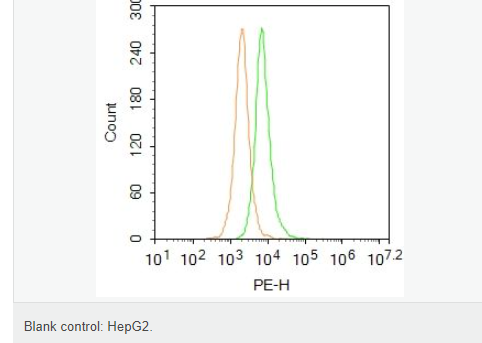

貨號
產(chǎn)品規(guī)格
售價(jià)
備注
BN40291R-100ul
100ul
¥2360.00
交叉反應(yīng):Human(predicted:Mouse,Rat,Chicken,Dog,Pig,Cow,Sheep) 推薦應(yīng)用:WB,IHC-P,IHC-F,ICC,IF,Flow-Cyt,ELISA
BN40291R-200ul
200ul
¥3490.00
交叉反應(yīng):Human(predicted:Mouse,Rat,Chicken,Dog,Pig,Cow,Sheep) 推薦應(yīng)用:WB,IHC-P,IHC-F,ICC,IF,Flow-Cyt,ELISA
產(chǎn)品描述
| 英文名稱 | CREB3L3 |
| 中文名稱 | 環(huán)腺苷酸應(yīng)答元件結(jié)合蛋白H抗體 |
| 別 名 | cAMP responsive element binding protein 3 like 3; cAMP responsive element-binding protein 3 like protein 3; CREB H; CREB/ATF family transcription factor; CREBH; Cyclic AMP responsive element binding protein 3 like protein 3; cAMP-responsive element-binding protein 3-like protein 3; HYST1481; MGC126553; MGC126557; Transcription factor CREB H; CR3L3_HUMAN. |
| 研究領(lǐng)域 | 轉(zhuǎn)錄調(diào)節(jié)因子 表觀遺傳學(xué) |
| 抗體來源 | Rabbit |
| 克隆類型 | Polyclonal |
| 交叉反應(yīng) | Human, (predicted: Mouse, Rat, Chicken, Dog, Pig, Cow, Sheep, ) |
| 產(chǎn)品應(yīng)用 | WB=1:500-2000 ELISA=1:5000-10000 IHC-P=1:100-500 IHC-F=1:100-500 Flow-Cyt=0.2ug/Test ICC=1:100-500 IF=1:100-500 (石蠟切片需做抗原修復(fù)) not yet tested in other applications. optimal dilutions/concentrations should be determined by the end user. |
| 分 子 量 | 49kDa |
| 細(xì)胞定位 | 細(xì)胞核 細(xì)胞漿 細(xì)胞膜 |
| 性 狀 | Liquid |
| 濃 度 | 1mg/ml |
| 免 疫 原 | KLH conjugated synthetic peptide derived from human CREB-H:201-300/461 |
| 亞 型 | IgG |
| 純化方法 | affinity purified by Protein A |
| 儲 存 液 | 0.01M TBS(pH7.4) with 1% BSA, 0.03% Proclin300 and 50% Glycerol. |
| 保存條件 | Shipped at 4℃. Store at -20 °C for one year. Avoid repeated freeze/thaw cycles. |
| PubMed | PubMed |
| 產(chǎn)品介紹 | CREB3L3 is a 461 amino acid single-pass type II membrane protein that localizes to the endoplasmic reticulum (ER) and, in response to ER stress, is cleaved and translocated to the nucleus. Expressed exclusively in liver, CREB3L3 functions as a transcription factor that, during ER stress, is thought to activate genes that are involved in both the unfolded protein response and the acute phase response (APR). Additionally, CREB3L3 is underexpressed in hepatocellular carcinoma, suggesting a possible role as a tumor suppressor. CREB3L3 functions as a dimer and contains one leucine zipper domain, a KDEL-like sequence and a bZIP domain, through which it conveys its DNA binding ability. Three isoforms of CREB3L3 exist due to alternative splicing events. Function: Transcription factor that may act during endoplasmic reticulum stress by activating unfolded protein response target genes. Activated in response to cAMP stimulation. In vitro, binds to the cAMP response element (CRE) and box-B element. Activates transcription through box-B element. Activates transcription through CRE (By similarity). Seems to function synergistically with ATF6. In acute inflammatory response, may activate expression of acute phase response (APR) genes. May be involved in growth suppression. Subunit: Binds DNA as a dimer (By similarity). Probably homodimerizes. Probably forms a heterodimer with ATF6. Interacts with ATF6. Subcellular Location: Endoplasmic reticulum membrane; Single-pass type II membrane protein. Nucleus. Tissue Specificity: Exclusively expressed in liver. Underexpressed in hepatocellular carcinoma tissues. Post-translational modifications: Controlled by regulated intramembrane proteolysis (RIP). Following ER stress a fragment containing the cytoplasmic transcription factor domain is released by proteolysis. The cleavage seems to be performed sequentially by site-1 and site-2 proteases (PS1 and PS2). N- and O-glycosylated. N-glycosylation is required for optimal proteolytic activation. O-glycosylated with core 1 or possibly core 8 glycans. Similarity: Belongs to the bZIP family. ATF subfamily. Contains 1 bZIP (basic-leucine zipper) domain. SWISS: Q68CJ9 Gene ID: 84699 Database links: Entrez Gene: 84699 Human Omim: 611998 Human SwissProt: Q68CJ9 Human Unigene: 247744 Human Important Note: This product as supplied is intended for research use only, not for use in human, therapeutic or diagnostic applications. |
